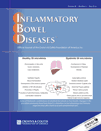Adalimumab in steroid-dependent Crohn's disease patients: Prognostic factors for clinical benefit
Abstract
Background:
Corticosteroids are effective in the treatment of Crohn's disease but some patients relapse during tapering or after discontinuation. We report data on efficacy and prognostic factors of response of adalimumab in steroid-dependent patients.
Methods:
In all, 110 steroid-dependent patients were treated with adalimumab (80/40 or 160/80 mg every other week followed by 40 mg every other week). Clinical remission was defined as steroid discontinuation without symptomatic recurrence and clinical response as the reduction or maintenance of the initial Crohn's Disease Activity Index (CDAI) value reducing steroid dosage but without its discontinuation at week 6 and at the end of follow-up.
Results:
At week 6, 91% of patients had a clinical benefit (remission: 45.5%, response: 45.5%). At the end of the follow-up (mean 14.6 months), 80.9% of responders maintained the clinical benefit (remission: 64.5%, response: 16.4%). At univariate analysis four variables were associated with remission at week 6: age of patients <40 years at baseline, no previous history of surgery, inflammatory pattern, and higher induction regimen. At multivariate analysis only higher induction regimen was related to remission at week 6. At the end of the follow-up, none of the variables were associated with remission. None of the variables were related to response at 6 weeks and at the end of follow-up. Adalimumab was well tolerated.
Conclusions:
This study shows that adalimumab is a powerful and safe weapon for steroid discontinuation in patients with steroid-dependent Crohn's disease. Higher induction regimen dosage is the better therapeutic choice for achieving clinical remission with low risk of clinical relapse. (Inflamm Bowel Dis 2011;)




